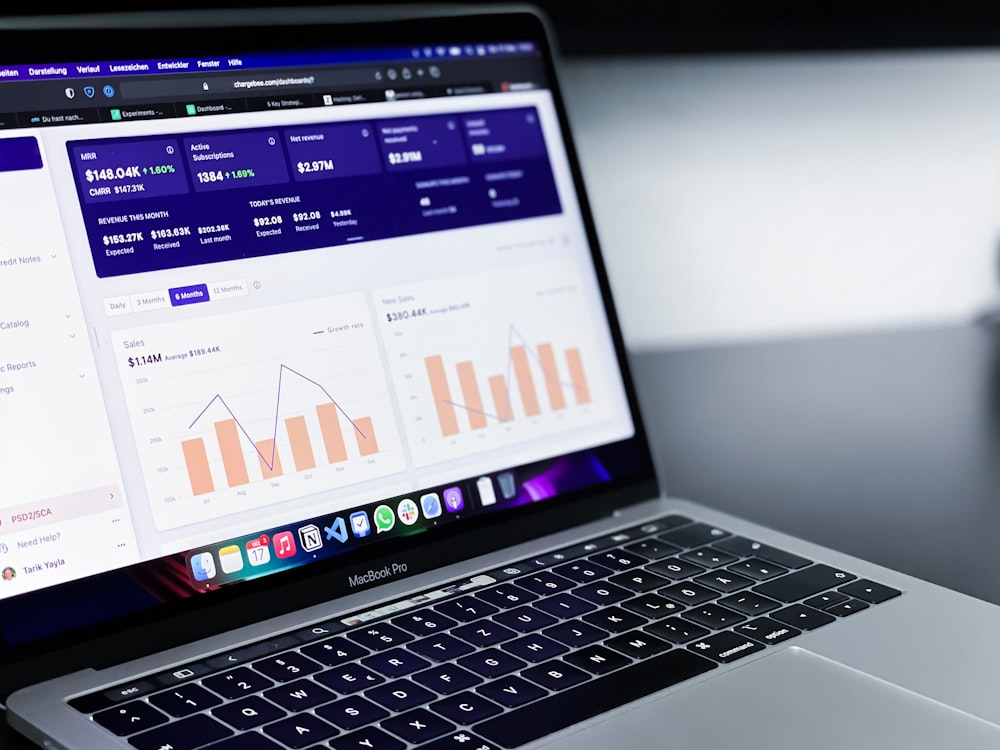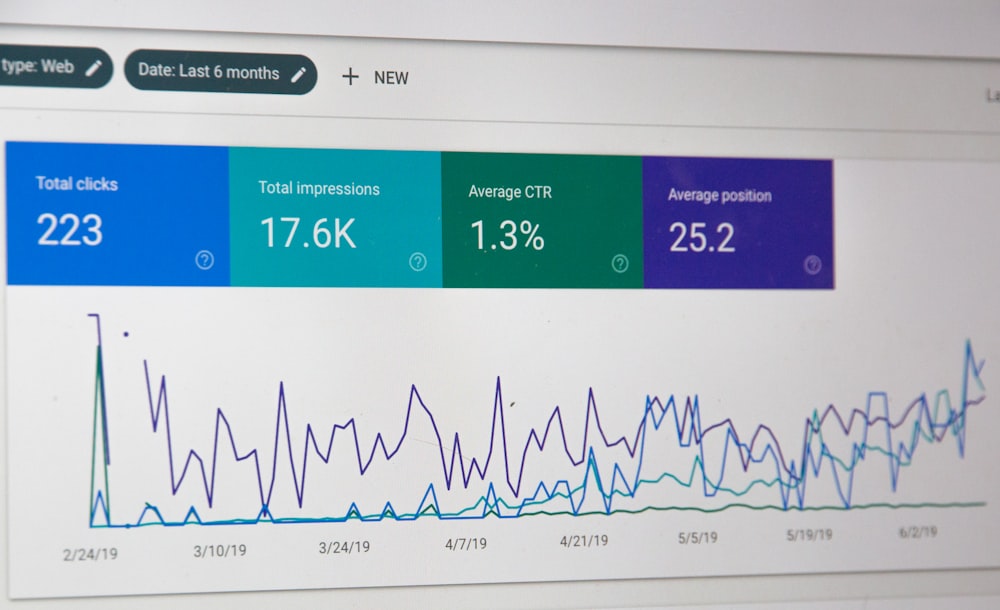Table of Contents
Undoubtedly, one of the most important aspects of any digital marketing strategy is tracking and understanding your KPIs and metrics. By doing so, you’ll be able to see what’s working and what isn’t, make necessary changes along the way, and ultimately improve your overall ROI.
But with all of the different KPIs and metrics, it can be tough to know where to start. We’ve put together this ultimate guide to digital marketing KPIs and metrics. In it, we’ll cover everything from web traffic metrics to conversion rate optimization (CRO) metrics.
By the end of this guide, you’ll have a clear understanding of which KPIs and metrics you should be tracking for your business. So let’s get started!
What Is A Digital Marketing KPI?
A KPI, or key performance indicator, is a metric businesses use to measure and track their marketing efforts. Digital marketing KPIs are those specific to online marketing and can include website visits, unique visitors, page views, bounce rate, time on site, and conversions.
Knowing which KPIs to measure and tracking them over time can help you determine the effectiveness of your digital marketing campaigns and make necessary adjustments to improve results.
Why Do You Need to Track Your KPIs?
There’s no doubt that you need to track your KPIs if you want to optimize your digital marketing campaign performance. You can identify what’s working and what isn’t and make the necessary adjustments to improve results by monitoring your key metrics.
There are several reasons why it’s important to track digital marketing KPIs:
To assess the performance of your digital marketing campaigns
Tracking your KPIs is also critical to proving the value of your digital marketing efforts. Without accurate metrics, it can be challenging to demonstrate the impact of your campaigns and justify your marketing budget requests.
To benchmark your performance
Comparing your current KPIs to historical data can help you benchmark your performance and set realistic goals for future campaigns. Without this data, it’s difficult to assess whether or not your campaigns are improving over time.
Make necessary adjustments to improve results
Campaigns get FAILED without effective tracking. You can’t fix what you don’t know is broken. By tracking your KPIs, you can quickly identify issues and make necessary adjustments to improve your results.
Allocate resources more effectively
Whatever resources you have should go to the places that will be most effective in achieving your marketing goals. If you’re not tracking your KPIs, you could be wasting time and money on campaigns and strategies that aren’t working.
The Most Important Digital Marketing Metrics
As a business owner or marketer, it’s essential to be aware of the most important digital marketing KPIs. By tracking and measuring these digital marketing analytics, you can gauge the effectiveness of your digital marketing campaigns and identify areas for improvement.
Here are some KPIs to measure success across different marketing channels.
1. General Marketing KPIs
Some general marketing KPIs that apply to digital marketing include website traffic, customer acquisition cost, conversion rate, and customer lifetime value. The crucial metrics include:
a. Website Traffic
One of the most important digital marketing KPIs is website traffic. By tracking the number of visitors to your website, you can gauge the overall success of your online marketing efforts.
b. Conversion Rate
The conversion rate is another crucial metric to track. This measures the percentage of visitors who take the desired action, such as making a purchase or subscribing to your email list.
c. ROI
ROI is a key metric for all types of marketing, and digital marketing is no exception. By measuring the return on investment for your digital campaigns, you can determine their effectiveness and allocate your resources accordingly.
d. CLV
The customer lifetime value is an important metric to track to measure the long-term success of your digital marketing campaigns. This measures the average value over the lifetime of their relationship with your business.
2. Search Engine Optimization (SEO) KPIs
To measure the success of your SEO efforts, you need to track several key performance indicators. These include website visitors from organic search, click-through rate, and organic search ranking.
a. Website Traffic from Organic Search
One of the most important SEO KPIs is organic traffic. By tracking the number of visitors coming to your website from Google, Bing, and other search engines, you can gauge the effectiveness of your SEO efforts.
b. Click-Through Rate
The click-through rate is also essential as it measures the percentage of people who click on your search engine results from links compared to the total number of people who see your listing.
c. Organic Search Ranking
The organic search ranking measures your website’s position in the search engine results pages for specific keywords or phrases.
3. Paid Advertising (PPC) KPIs
To measure the success of your PPC campaigns, you need to track several key performance indicators. These include click-through rate, cost per click, and conversion rate.
a. Click-Through Rate
The click-through rate is the most influential PPC metric to track. This measures the percentage of people who click on your ad compared to the total number of people who see it.
b. Cost Per Click
The cost per click measures how much you’re spending on average for each click on your ad. It’s important to shape the budget of your digital marketing strategy.
c. Conversion Rate
The conversion rate is another important metric to track. After clicking on your ad, this measures the percentage of people who take the desired action, such as making a purchase or signing up for your email list. It’ll track paying customers you gained after implementing your media strategy.
4. Social Media KPIs
To measure the effectiveness of your social media channels campaigns, you need to track several key performance indicators. These include fan or follower growth, engagement rate, and website traffic from social media optimized by your marketing team.
a. Fan or Follower Growth
One of the most important social media KPIs is fan or follower growth. By tracking the number of new fans or followers you acquire each month, you can gauge the overall success of your social media campaigns.
b. Engagement Rate
The engagement rate is another critical metric, and it analyzes the percentage of fans or followers who engage with your content, such as liking, commenting, or sharing.
c. Website Traffic from Social Media
Website traffic from social media is another crucial metric to track. By tracking the number of visitors coming to your website from Facebook, Twitter, and other social networks, you can see how effectively your social media campaigns drive traffic to your website. You can use Google Analytics for this purpose, which will also give insights into the revenue generated.
5. Email Marketing KPIs
The digital marketing metrics in the case of emails include click-through rate, open rate, and conversion rate. Measure them to check your business performance.
a. Click-Through Rate
The click-through rate is the essential email marketing metric to track. This measures the percentage of people who click on your email compared to the total number of people who see it.
b. Open Rate
The open rate measures the percentage of people who open your email compared to the total number of people who receive it.
c. Conversion Rate
After clicking on one of your emails, the conversion rate measures the percentage of people who take the desired action, such as making a purchase or signing up for your email list.
How to Choose the Right KPIs to Track?
When choosing the right KPIs to track, you must first consider what you’re trying to achieve. Are you looking for ways to improve your overall performance? Or are you looking for ways to improve a specific process or area of your business?
Once you know what you’re trying to achieve, you can start identifying which KPIs will help you measure that goal. Ensure the KPIs you choose are specific, measurable, achievable, relevant, and timely. That way, you’ll be able to track your progress and see results quickly.
If you’re not sure where to start, here are a few tips:
If you’re not sure where to start, here are a few tips:
- Identify which areas of your business need improvement.
- Consider what you want to achieve with your digital marketing strategy.
- Look for KPIs that are closely related to your goal.
- Make sure the metrics are easy to measure and track.
- Choose KPIs that are relevant to your business and industry.
- Set deadlines for reaching your goals and choose timely KPIs.
- Use benchmarking data to help you choose relevant metrics.
- Keep track of how well you’re doing against your KPIs, and make changes as needed.
What To Avoid Tracking?
There are plenty of things you could track in your business, but not all are necessary or even useful for marketing performance. Here are a few things you should avoid tracking:
1. Unrelevant data: Don’t track information that doesn’t help you make decisions or improve your business.
2. Outdated data: Make sure you’re tracking recent data to make timely decisions.
3. Vague goals: Make sure your KPIs are specific and measurable to track your progress.
4. Unnecessary data duplication: Avoid tracking the same information in multiple places.
Summing Up
The goal of any digital marketer is to produce quantifiable results that can be analyzed and improved upon over time. However, with so many different metrics and KPIs at our disposal, it can be difficult to know which ones are most important for your specific business or campaign.
By understanding the different types of data, you can collect and how they impact your bottom line, you can develop a metric strategy explicitly tailored to your needs. What steps will you take now that you’ve read our digital marketing KPIs and metrics guide? Let us know in the comments.

Want more SEO traffic?
Discovering the secret to increasing your website’s traffic could be as simple as accessing this Free SEO analyzer tool!
Try it - it's free








